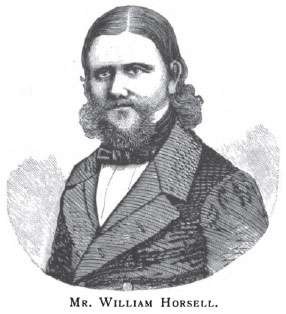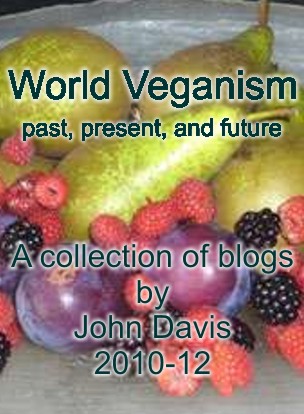July 27, 2011
 The Truth Tester was first published in England in 1845, as a temperance (anti-alcohol) journal.
The Truth Tester was first published in England in 1845, as a temperance (anti-alcohol) journal.
In August 1846 a new editor, William Horsell, based near London, took over and incorporated 'The Healthian', first published in 1842 by the strictly vegan Alcott House Academy.
In his first introduction to the combined journal the new editor stated it would advocate "...entire abandonment of alcoholic drinks, animal-food, tea and coffee, drugs, tobacco and snuff, and condiments".
Following are some extracts and comments from the next two years:
September 1846 - RECIPE FOR A PLAIN BIRD'S NEST SAGO PUDDING (the earliest known deliberately vegan recipe)
Soak half-a-pint of sago in three pints of water, stirring it occasionally until it is uniformly swelled. Pare and core ten or twelve apples, fill the holes in the centre with sugar, and put them, without piling them one over the other, in a nappy or pudding dish, of such size that the sago will just cover them. The sago, which may be seasoned with spice or sugar to suit the palate, may then be poured on, and the pudding baked until the apples are quite soft. It may be made thicker or thinner at pleasure, by using more or less sago. We sometimes boil the sago before baking, and pour it while hot upon the apples. We think the pudding no better, except that it may be baked much quicker. It must be set in a cold pure air when done, and may be eaten cold or hot.
Who ever heard of a pudding without butter, eggs, or milk? Try it - try it; and may you like it as well, and eat less of it than does A VEGETABLE EPICURE.
May 1847 - A letter from a reader in Hampshire suggested; "... has seemed to me desirable... namely the occasional or periodical meeting together of vegetarians - or the formation of societies for mutual instruction and encouragement."
 This was the first time anyone had proposed forming a Vegetarian Society, and it was quickly followed up by William Oldham, the business manager of Alcott House Academy (at this time the word 'vegetarian' meant what we now call 'vegan'). In the June 1847 issue the lead article was a letter from Mr. Oldham announcing a 'Physiological Conference' at Alcott House on Thursday the 8th of July. We were told later that about 50 people attended.
This was the first time anyone had proposed forming a Vegetarian Society, and it was quickly followed up by William Oldham, the business manager of Alcott House Academy (at this time the word 'vegetarian' meant what we now call 'vegan'). In the June 1847 issue the lead article was a letter from Mr. Oldham announcing a 'Physiological Conference' at Alcott House on Thursday the 8th of July. We were told later that about 50 people attended.
By 1847 Alcott House was struggling financially, and eventually closed the following year. Meanwhile they had made contact with the Bible Christian Church in Salford, near Manchester, which included some very wealthy and influential people and banned the eating of animal flesh. All very useful to Alcott House at that point - but with the problem that the Bible Christians did not ban the use of eggs and dairy products, making things awkward for the cash-strapped, but strictly vegan, Alcott House.
August 1847 - THE VEGETARIAN TABLE
This was an article, apparently by Hannah Bond, the matron of Alcott House, giving full details of the food served at the 'Physiological Conference'. She included a 'Herb Pie' made with eggs and milk, stating that it: "... participates to some degree of the animal secretions, though not of their substance, it is well qualified to become a popular dish in helping passengers over the stream from the carnivorous to the herbivorous region."
We can almost hear Hannah gritting her teeth as she accommodated the preference of their wealthy new friends. But it didn't work, the Bible Christians never did get more than half-way across the stream to veganism.
A second meeting was held on September 30, 1847, at the Hydropathic Hospital in Ramsgate, Kent, which was managed by William Horsell. During this the world's first Vegetarian Society was formally launched, with its objective being merely to 'abstain from the flesh of animals'.
 The Truth Tester included occasional viewpoints from eggs/dairy users and even meat-eaters, but the editorial emphasis was clear, as can be seen in a letter from a British reader in India, in the November 1847 issue:
The Truth Tester included occasional viewpoints from eggs/dairy users and even meat-eaters, but the editorial emphasis was clear, as can be seen in a letter from a British reader in India, in the November 1847 issue:
"Sir, - I am a subscriber to the Truth-Tester, and a vegetarian. I address you from this distant part of the world, to enquire whether you know of any such work as a treatise on domestic cookery, for the use of those who confine themselves strictly to a vegetable regimen?... I have seen a book on 'Vegetable Cookery, by a Lady,' and suppose it to have been published under the patronage or countenance of the Society of Bible Christians. But it recommends the use of eggs, milk, butter, and all manner of injurious spices, all of which are known by pure vegetable-eaters to be hurtful to human health and happiness. What I wish to know is, whether there be any work on the subject for the use of exclusive vegetarians in the strictest sense?... If there be no such work, I think there should be, and a fitter person than the editor of the Tester could not be found, perhaps to cause one to be written... Calcutta, June 23, 1847."
The lady who wrote the cookbook was Martha Brotherton, wife of Joseph Brotherton who was the Member of Parliament for Salford, a very prominent Bible Christian, and chairman of the meeting that founded the Vegetarian Society.
No reply to the letter was printed. By the time it was published, the editor, William Horsell, still in the London area, was also the Secretary of the new Vegetarian Society - and James Simpson, the wealthiest of the Bible Christians, was the first President.
Within a couple of years the cracks in this uneasy alliance split completely. Simpson moved all operations of the Vegetarian Society to the Manchester area, where it has been based ever since.
 John Davis
John Davis
